外研版(2019)选择性必修第三册 Unit4 A glimpse of the future Using language 公开课课件(共60张PPT)
文档属性
| 名称 | 外研版(2019)选择性必修第三册 Unit4 A glimpse of the future Using language 公开课课件(共60张PPT) | 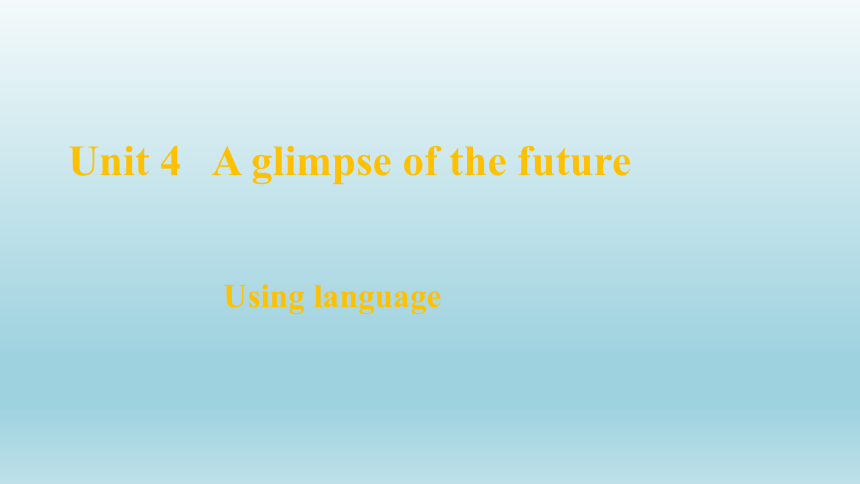 | |
| 格式 | pptx | ||
| 文件大小 | 1.1MB | ||
| 资源类型 | 教案 | ||
| 版本资源 | 外研版(2019) | ||
| 科目 | 英语 | ||
| 更新时间 | 2023-03-06 18:44:07 | ||
图片预览


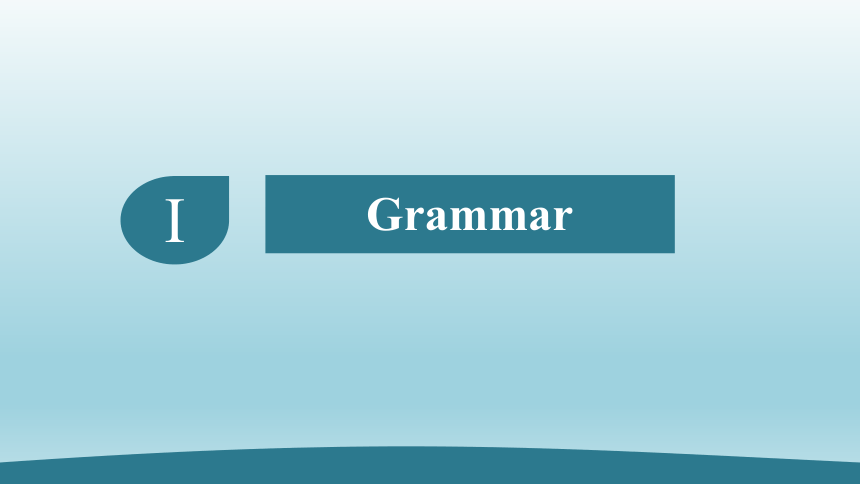
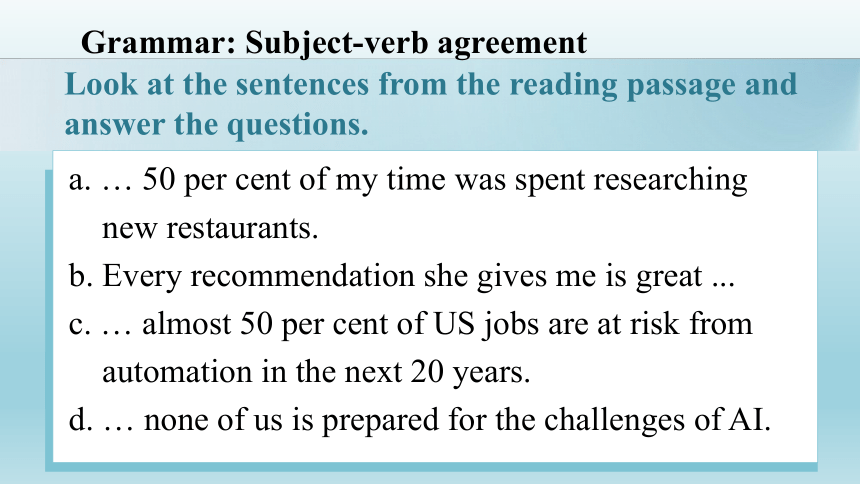
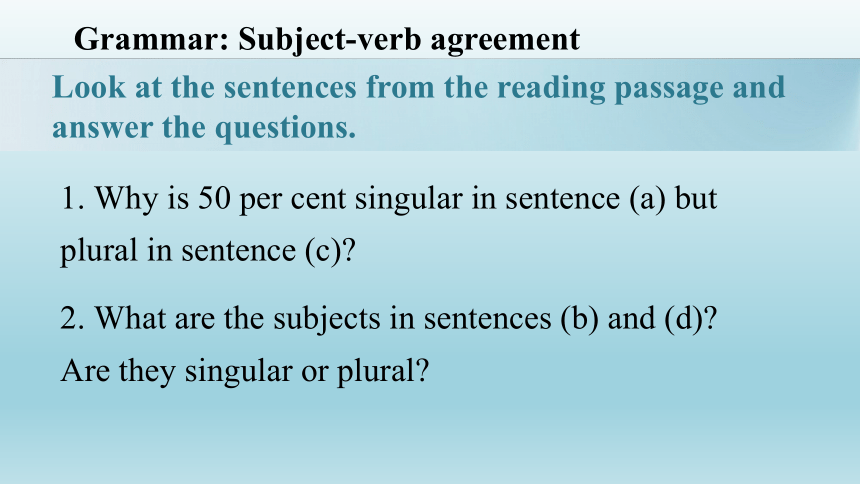

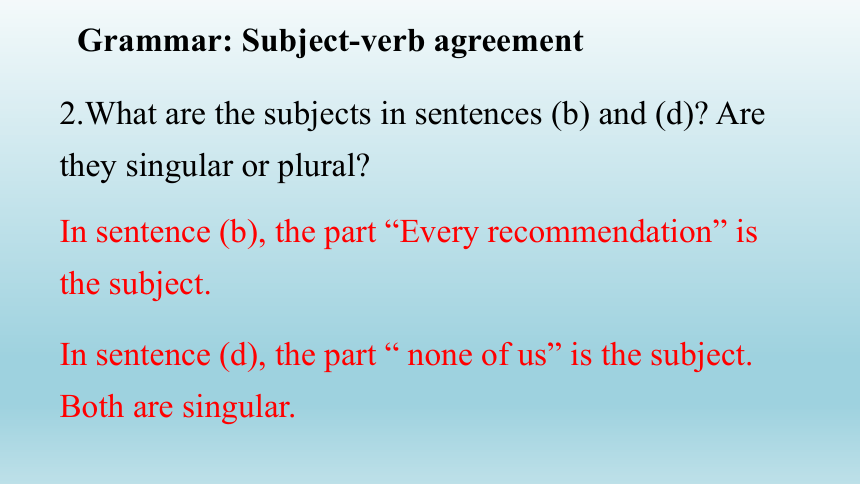
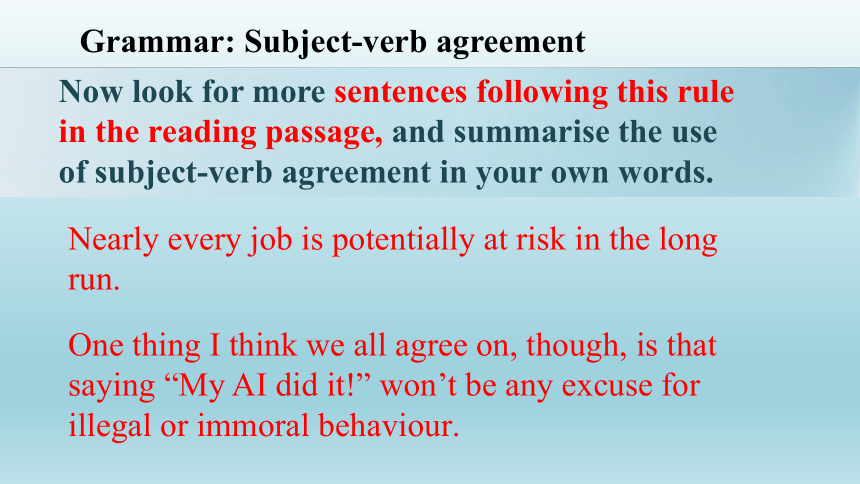




文档简介
(共60张PPT)
Using language
Unit 4 A glimpse of the future
目录
contents
Grammar
Listening & speaking
Homework
Vocabulary building
I
II
III
Ⅳ
I
Grammar
Grammar: Subject-verb agreement
Look at the sentences from the reading passage and answer the questions.
a. … 50 per cent of my time was spent researching
new restaurants.
b. Every recommendation she gives me is great ...
c. … almost 50 per cent of US jobs are at risk from
automation in the next 20 years.
d. … none of us is prepared for the challenges of AI.
1. Why is 50 per cent singular in sentence (a) but plural in sentence (c)
2. What are the subjects in sentences (b) and (d) Are they singular or plural
Grammar: Subject-verb agreement
Look at the sentences from the reading passage and answer the questions.
1. Why is 50 per cent singular in sentence (a) but plural in sentence (c)
Grammar: Subject-verb agreement
Look at the sentences from the reading passage and answer the questions.
Because in sentence (a), the part “50 per cent” is followed by the uncountable noun “time”, while in sentence (c), the part “50 per cent” is followed by the countable noun “job” in its plural form.
2.What are the subjects in sentences (b) and (d) Are they singular or plural
In sentence (b), the part “Every recommendation” is the subject.
Grammar: Subject-verb agreement
In sentence (d), the part “ none of us” is the subject. Both are singular.
Now look for more sentences following this rule in the reading passage, and summarise the use of subject-verb agreement in your own words.
One thing I think we all agree on, though, is that saying “My AI did it!” won’t be any excuse for illegal or immoral behaviour.
Nearly every job is potentially at risk in the long run.
Grammar: Subject-verb agreement
主谓一致
主谓一致是指主语和谓语在人称和数等方面的一致,当主语是不定代词或含有修饰语时,谓语动词的形式要依据主语所表达的单、复数概念而定,而不仅仅是取决于简单的外在形式。
Grammar: Subject-verb agreement
主谓一致
用法归纳 1: 当主语被分数(百分数)、表示量的词汇等修饰时,谓语动词的形式要依据主语本身进行判断,具体如下:
Grammar: Subject-verb agreement
如果主语是可数名词复数,或主语加上修饰语后整体表达的是复数概念,那么谓语动词要用复数形式。
如果主语本身是可数名词单数或者不可数名词,则谓语动词要用单数形式;
主谓一致
例1:About one-third of the books in the library are donated by students who graduated from the school.
图书馆里大约三分之一的书都是由这所学校的毕业生捐赠的。
Grammar: Subject-verb agreement
解析:book 是可数名词,在句中是复数形式,并且在句中着重于书的数量而不是将书视为整体,因此“三分之一的书”表达的意义是复数概念,谓语动词用 are。
例2:
Around 10 per cent of the forest is destroyed each year.
每年大约有10%的森林被毁。
主谓一致
Grammar: Subject-verb agreement
解析:本句中的 the forest 为可数名词的单数形式,
泛指森林,因此“10%的森林”视作一个整体,
谓语动词用 is。
例3:
A large number of people have applied for the job.
许多人都申请了这份工作。
Grammar: Subject-verb agreement
主谓一致
解析:本句中的 people 为集体名词,表示复数概念,因此谓语动词用 have。
Practice:
1) Fifty percent of the students in our school ____ girls.
2) Three-fourths of the surface of the earth____ sea.
3) Over sixty percent of the city _____ destroyed in the war.
Grammar: Subject-verb agreement
主谓一致
are
is
was
Grammar: Subject-verb agreement
主谓一致
解析:1) 主语本身为可数名词复数 students,故用 are。
2) 主语为 surface“表面”,且句中“地球表面的四分之三”为整体概念,故用 is。
3) 主语为 city,在此为可数名词单数,故用 was。
用法归纳 2:常用的表示“量”的短语后面接名词的谓语情况
1) a number of / a variety of / varieties of +可数名词复数作主语时,谓语动词用复数形式。
主谓一致
Grammar: Subject-verb agreement
a large amount of +不可数名词,谓语动词用单数;
large amounts of +不可数名词, 谓语动词用复数。
主谓一致
Grammar: Subject-verb agreement
A number of new houses have been built there.
A variety of products are on sale now.
A large amount of money was spent on the bridge.
Large amounts of money were spent on the bridge.
用法归纳 2:常用的表示“量”的短语后面接名词的谓语情况
主谓一致
用法归纳 3:
当主语被不定代词修饰或主语本身是不定代词时,谓语动词的形式需要根据主语加上修饰语后整体表达的意义来进行判断。
Grammar: Subject-verb agreement
主谓一致
Grammar: Subject-verb agreement
例如:Every means has been tried out without much result.
所有方法都试过了,却没有什么效果。
解析:means 是方法的意思,every means 强调每一种方法,故谓语动词用单数形式。
主谓一致
Grammar: Subject-verb agreement
Practice:
1) Each boy ______ a prize.
2) Many of us _____ gone through regular training.
3) Every possible approach ______ been tried, but in vain.
4) Both of the instruments _____ not precise ones.
5) Something _____ going to happen, and nobody can stop it from happening.
have
has
are
gets
is
主谓一致
Grammar: Subject-verb agreement
用法归纳 4:
all 作主语表示人时,谓语动词用复数;表示物时,谓语动词用单数,例如:
2) All are eager to reach an agreement.
大家都急于达成一项协议。
1) All is well that ends well.
结果好一切都好。
主谓一致
Grammar: Subject-verb agreement
用法归纳 5:
none 作主语时,谓语动词既可用单数也可用复数,这要取决于说话人的看法,如:
1) None of us seem to have thought of it.
似乎我们全都没有想到这一点。
(此处强调全体,全部都没有想到。)
主谓一致
Grammar: Subject-verb agreement
2) None of us has got a camera.
(none = not a single one)
我们都没有照相机。
(此处强调每一个个体,没有一个有照相机的。)
主谓一致
Grammar: Subject-verb agreement
用法归纳 6:
当主语被否定词修饰或主语本身是否定词时,谓语动词一般用单数形式。例如:
例1:Nobody has got a ticket. (谁都没有票。)
例2:Nothing was available.(没有可用的。)
Complete the passage by choosing the singular or plural form.
Grammar: Subject-verb agreement
Nowadays, some companies offer genetic testing for children’s talents. A large number of clients have / has been attracted to it. They are parents, eager to know what talents their children may have in the future. The process is simple. Every child provide / provides a small sample of blood or body tissue. This is /
√
√
√
Complete the passage by choosing the singular or plural form.
Grammar: Subject-verb agreement
These are analysed. Each of the children is / are given a report showing their possible talents. A recent example cited on the website is that one of the testing companies compare / compares the talents of twins Bobby and Benny. Bobby was assessed and his talents was / were revealed to be mostly scientific: a
√
√
√
Complete the passage by choosing the singular or plural form.
Grammar: Subject-verb agreement
66% chance of success in chemistry and 54% in physics was / were shown. Meanwhile, Benny’s highest score was / were shown to be in an arts subject: the test gave him 68% for literary studies. Is genetic testing reliable Some scientists say that more evidence is / are needed.
√
√
√
Complete the description according to the charts, paying attention to subject-verb agreement.
Grammar: Subject-verb agreement
Future
Last week, we asked you to design your ideal planet for people on Earth to live on in the 22nd century. We have received over 500 entries and have been amazed by your imaginations! Here’s one of the designs.
Grammar: Subject-verb agreement
Grammar: Subject-verb agreement
Complete the description according to the charts, paying attention to subject-verb agreement.
Three quarters of the surface is made up of land, while the rest is sea, covering 25% of the surface.
Half of the land is covered with trees. Residential area and arable land both account for the same proportion,
Grammar: Subject-verb agreement
Complete the description according to the charts, paying attention to subject-verb agreement.
20% of the total land. The rest is desert, covering 10%
of the total land. There are three kinds of people. Fifty per cent of the people are original residents, 30% are from Earth and 20% are from other planets.
Discussion: Describe another planet for the future, paying attention to subject-verb agreement.
Grammar: Subject-verb agreement
The following questions may be of help to you:
Is there some water for its residents to use
Is the temperature on that planet suitable for people to live in
Here are some words for some planets:
Venus: 金星 Mercury: 水星
Mars: 火星 Jupiter: 木星 Saturn: 土星
II
Listening & speaking
Listening & speaking: Before listening
The world of tomorrow
Listening & speaking
Do You Know
Time travel could result in a paradox — an event that contradicts itself. For example, if a person travelled back in time and prevented an event, that event would never have happened; there would therefore be no reason for the person to travel back in time to prevent it.
Listening & speaking
Listen to the conversation and choose its main idea.
Correct answer: 3
Time travel is dangerous.
Talking to people in the past can change the future.
Anything you say or do in the past can affect the future.
4. Time travel within your own lifetime should be avoided.
Listening & speaking
Listen again and complete the table.
RULE 1 1__________________________________
● A tourist wants to 2_________________________
__________________________________________.
because 3___________________________________.
● The guide told her 4 ______________________.
Don’t talk to anybody.
tell her 8-year-old self to buy shares in companies that are profitable today
she wants to become rich
not to do that
Listening & speaking
Listen again and complete the table.
RULE 2 5__________________________________
● The guide said that 6_________________________
___________________________________________
Be careful not to break anything.
breaking something could also cause a paradox and change your path through life.
Listening & speaking
Listen again and complete the table.
RULE 3 7__________________________________
_________________________________________
● A tourist wants to 8_________________________
● The guide told him not to because 9 ___________ ___________________________________________
______________________________
Never give anything from our time to someone in the past.
give a present to his father.
anything that doesn’t belong to that time may have an impact on someone and cause a paradox.
Listening & speaking: Discussion
Now work in pairs. Take turns to be the guide and explain the rules of time travel.
1. There are altogether 3 rules of time travel. The first is ..., the second is ..., and the last one is ...
2. There are 3 rules of time travel in total. The first is ..., the second is ..., and the last one is ...
Sentences that may help you explain the rules:
Listening & speaking: Discussion
Now work in pairs. Take turns to be the guide and explain the rules of time travel.
3. Every tourist is supposed to bear 3 rules of time travel in mind. The first is ..., the second is ..., and the last one is ...
Sentences that may help you explain the rules :
Listening & speaking
Complete the boxes with the expressions from the conversation.
Amazing!
Wow!
I can’t wait to ...
So, what you’re saying is that ...
How about ...
Imagine how excited ...
Listening & speaking
Complete the boxes with the expressions from the conversation.
That’s Ok, isn’t it
Are you serious
Let me get this straight. You mean that ...
It’ll be exciting enough to ...
Listening & speaking
Complete the boxes with the expressions from the conversation.
Expressing excitement
2. Wow!
1. Amazing!
3. I can’t wait to …
4. Imagine how excited …
5. It’ll be exciting enough to …
Listening & speaking
Complete the boxes with the expressions from the conversation.
Asking for confirmation
4. Are you serious
1. So, what you’re saying is that
2. How about …
3. That’s OK, isn’t it
5. Let me get this straight. You mean that …
III
Vocabulary building
Vocabulary building
Background Information
future life
With the AI technology developing at such a high speed, our future life is bound to be quite colorful and dynamic. What aspects of future life will benefit us a lot
Read the passage and put the expressions in bold into the boxes.
Besides time travel, we have much to look forward to in the future, thanks to advances in technology. One area that is likely to change dramatically within our lifetimes is medical care. Although I wouldn’t bank on patients feeling confident about seeing a robot
Vocabulary building
Read the passage and put the expressions in bold into the boxes.
doctor any time soon, I’m sure that AI doctors are on the horizon. I think it’s also fair to say that we can get our hopes up when it comes to finding cures for serious diseases, such as cancer. I reckon that nanorobots that
can eliminate cancerous cells are just around the
Vocabulary building
Read the passage and put the expressions in bold into the boxes.
corner. Some of these ideas may sound far ahead of their time, but I’m sure they’re bound to happen sooner or later!
Vocabulary building
Read the passage and put the expressions in bold into the boxes.
Expressions about time
1. within our lifetimes
2. any time soon
3. on the horizon
4. around the corner
5. far ahead of their time
Vocabulary building
Read the passage and put the expressions in bold into the boxes.
Expressions about expectation
1. bank on
2. get our hopes up
3. bound to happen
Vocabulary building
Vocabulary building
Complete the passage with the expressions in Activity 8.
Who knows in what exciting ways transport will change 1 __________________ Trains that travel at the speed of today’s aeroplanes may sound 2____________________, but scientists are already developing “hyperloop” trains that travel at over 1,000 km per hour. And although we can’t 3__________flying
within our lifetimes
far ahead of their time
bank on
Vocabulary building
Complete the passage with the expressions in Activity 8.
cars being the norm 4 _______________, there are plans to introduce flying taxis that will be stationed on rooftops around busy cities. Many cities already have elevated cycle paths and I’m sure that these are
5 ______________ for many others around the world. As well as faster, safer and more comfortable transport being just 6_______________________________,
bound to happen
on the horizon / around the corner
any time soon
Vocabulary building
Complete the passage with the expressions in Activity 8.
we can also 7_________________ about shorter waiting times, with companies intending to provide on-demand services.
get our hopes up
Work in pairs. Talk about another aspect of life in the future using the expressions you have learnt in this section.
Vocabulary building
A: How do you think the schools and the classes in the future
B: I think probably there will be virtual schools and students around the globe who won’t have to go to school.
Vocabulary building
Now think about how effectively your partner used these expressions, and what you could learn from him or her.
Example:
A: Wow. So if there are not realistic schools, what will the students miss
B: Er ..., they are bound to miss lots of opportunities to …
Vocabulary building
Now think about how effectively your partner used these expressions, and what you could learn from him or her.
Ⅳ
Homework
Homework
1. Summarize the usage of subject-verb agreement and do the relevant exercises.
2. If you have one dream about AI that can be realized at once, what is your dream
Using language
Unit 4 A glimpse of the future
目录
contents
Grammar
Listening & speaking
Homework
Vocabulary building
I
II
III
Ⅳ
I
Grammar
Grammar: Subject-verb agreement
Look at the sentences from the reading passage and answer the questions.
a. … 50 per cent of my time was spent researching
new restaurants.
b. Every recommendation she gives me is great ...
c. … almost 50 per cent of US jobs are at risk from
automation in the next 20 years.
d. … none of us is prepared for the challenges of AI.
1. Why is 50 per cent singular in sentence (a) but plural in sentence (c)
2. What are the subjects in sentences (b) and (d) Are they singular or plural
Grammar: Subject-verb agreement
Look at the sentences from the reading passage and answer the questions.
1. Why is 50 per cent singular in sentence (a) but plural in sentence (c)
Grammar: Subject-verb agreement
Look at the sentences from the reading passage and answer the questions.
Because in sentence (a), the part “50 per cent” is followed by the uncountable noun “time”, while in sentence (c), the part “50 per cent” is followed by the countable noun “job” in its plural form.
2.What are the subjects in sentences (b) and (d) Are they singular or plural
In sentence (b), the part “Every recommendation” is the subject.
Grammar: Subject-verb agreement
In sentence (d), the part “ none of us” is the subject. Both are singular.
Now look for more sentences following this rule in the reading passage, and summarise the use of subject-verb agreement in your own words.
One thing I think we all agree on, though, is that saying “My AI did it!” won’t be any excuse for illegal or immoral behaviour.
Nearly every job is potentially at risk in the long run.
Grammar: Subject-verb agreement
主谓一致
主谓一致是指主语和谓语在人称和数等方面的一致,当主语是不定代词或含有修饰语时,谓语动词的形式要依据主语所表达的单、复数概念而定,而不仅仅是取决于简单的外在形式。
Grammar: Subject-verb agreement
主谓一致
用法归纳 1: 当主语被分数(百分数)、表示量的词汇等修饰时,谓语动词的形式要依据主语本身进行判断,具体如下:
Grammar: Subject-verb agreement
如果主语是可数名词复数,或主语加上修饰语后整体表达的是复数概念,那么谓语动词要用复数形式。
如果主语本身是可数名词单数或者不可数名词,则谓语动词要用单数形式;
主谓一致
例1:About one-third of the books in the library are donated by students who graduated from the school.
图书馆里大约三分之一的书都是由这所学校的毕业生捐赠的。
Grammar: Subject-verb agreement
解析:book 是可数名词,在句中是复数形式,并且在句中着重于书的数量而不是将书视为整体,因此“三分之一的书”表达的意义是复数概念,谓语动词用 are。
例2:
Around 10 per cent of the forest is destroyed each year.
每年大约有10%的森林被毁。
主谓一致
Grammar: Subject-verb agreement
解析:本句中的 the forest 为可数名词的单数形式,
泛指森林,因此“10%的森林”视作一个整体,
谓语动词用 is。
例3:
A large number of people have applied for the job.
许多人都申请了这份工作。
Grammar: Subject-verb agreement
主谓一致
解析:本句中的 people 为集体名词,表示复数概念,因此谓语动词用 have。
Practice:
1) Fifty percent of the students in our school ____ girls.
2) Three-fourths of the surface of the earth____ sea.
3) Over sixty percent of the city _____ destroyed in the war.
Grammar: Subject-verb agreement
主谓一致
are
is
was
Grammar: Subject-verb agreement
主谓一致
解析:1) 主语本身为可数名词复数 students,故用 are。
2) 主语为 surface“表面”,且句中“地球表面的四分之三”为整体概念,故用 is。
3) 主语为 city,在此为可数名词单数,故用 was。
用法归纳 2:常用的表示“量”的短语后面接名词的谓语情况
1) a number of / a variety of / varieties of +可数名词复数作主语时,谓语动词用复数形式。
主谓一致
Grammar: Subject-verb agreement
a large amount of +不可数名词,谓语动词用单数;
large amounts of +不可数名词, 谓语动词用复数。
主谓一致
Grammar: Subject-verb agreement
A number of new houses have been built there.
A variety of products are on sale now.
A large amount of money was spent on the bridge.
Large amounts of money were spent on the bridge.
用法归纳 2:常用的表示“量”的短语后面接名词的谓语情况
主谓一致
用法归纳 3:
当主语被不定代词修饰或主语本身是不定代词时,谓语动词的形式需要根据主语加上修饰语后整体表达的意义来进行判断。
Grammar: Subject-verb agreement
主谓一致
Grammar: Subject-verb agreement
例如:Every means has been tried out without much result.
所有方法都试过了,却没有什么效果。
解析:means 是方法的意思,every means 强调每一种方法,故谓语动词用单数形式。
主谓一致
Grammar: Subject-verb agreement
Practice:
1) Each boy ______ a prize.
2) Many of us _____ gone through regular training.
3) Every possible approach ______ been tried, but in vain.
4) Both of the instruments _____ not precise ones.
5) Something _____ going to happen, and nobody can stop it from happening.
have
has
are
gets
is
主谓一致
Grammar: Subject-verb agreement
用法归纳 4:
all 作主语表示人时,谓语动词用复数;表示物时,谓语动词用单数,例如:
2) All are eager to reach an agreement.
大家都急于达成一项协议。
1) All is well that ends well.
结果好一切都好。
主谓一致
Grammar: Subject-verb agreement
用法归纳 5:
none 作主语时,谓语动词既可用单数也可用复数,这要取决于说话人的看法,如:
1) None of us seem to have thought of it.
似乎我们全都没有想到这一点。
(此处强调全体,全部都没有想到。)
主谓一致
Grammar: Subject-verb agreement
2) None of us has got a camera.
(none = not a single one)
我们都没有照相机。
(此处强调每一个个体,没有一个有照相机的。)
主谓一致
Grammar: Subject-verb agreement
用法归纳 6:
当主语被否定词修饰或主语本身是否定词时,谓语动词一般用单数形式。例如:
例1:Nobody has got a ticket. (谁都没有票。)
例2:Nothing was available.(没有可用的。)
Complete the passage by choosing the singular or plural form.
Grammar: Subject-verb agreement
Nowadays, some companies offer genetic testing for children’s talents. A large number of clients have / has been attracted to it. They are parents, eager to know what talents their children may have in the future. The process is simple. Every child provide / provides a small sample of blood or body tissue. This is /
√
√
√
Complete the passage by choosing the singular or plural form.
Grammar: Subject-verb agreement
These are analysed. Each of the children is / are given a report showing their possible talents. A recent example cited on the website is that one of the testing companies compare / compares the talents of twins Bobby and Benny. Bobby was assessed and his talents was / were revealed to be mostly scientific: a
√
√
√
Complete the passage by choosing the singular or plural form.
Grammar: Subject-verb agreement
66% chance of success in chemistry and 54% in physics was / were shown. Meanwhile, Benny’s highest score was / were shown to be in an arts subject: the test gave him 68% for literary studies. Is genetic testing reliable Some scientists say that more evidence is / are needed.
√
√
√
Complete the description according to the charts, paying attention to subject-verb agreement.
Grammar: Subject-verb agreement
Future
Last week, we asked you to design your ideal planet for people on Earth to live on in the 22nd century. We have received over 500 entries and have been amazed by your imaginations! Here’s one of the designs.
Grammar: Subject-verb agreement
Grammar: Subject-verb agreement
Complete the description according to the charts, paying attention to subject-verb agreement.
Three quarters of the surface is made up of land, while the rest is sea, covering 25% of the surface.
Half of the land is covered with trees. Residential area and arable land both account for the same proportion,
Grammar: Subject-verb agreement
Complete the description according to the charts, paying attention to subject-verb agreement.
20% of the total land. The rest is desert, covering 10%
of the total land. There are three kinds of people. Fifty per cent of the people are original residents, 30% are from Earth and 20% are from other planets.
Discussion: Describe another planet for the future, paying attention to subject-verb agreement.
Grammar: Subject-verb agreement
The following questions may be of help to you:
Is there some water for its residents to use
Is the temperature on that planet suitable for people to live in
Here are some words for some planets:
Venus: 金星 Mercury: 水星
Mars: 火星 Jupiter: 木星 Saturn: 土星
II
Listening & speaking
Listening & speaking: Before listening
The world of tomorrow
Listening & speaking
Do You Know
Time travel could result in a paradox — an event that contradicts itself. For example, if a person travelled back in time and prevented an event, that event would never have happened; there would therefore be no reason for the person to travel back in time to prevent it.
Listening & speaking
Listen to the conversation and choose its main idea.
Correct answer: 3
Time travel is dangerous.
Talking to people in the past can change the future.
Anything you say or do in the past can affect the future.
4. Time travel within your own lifetime should be avoided.
Listening & speaking
Listen again and complete the table.
RULE 1 1__________________________________
● A tourist wants to 2_________________________
__________________________________________.
because 3___________________________________.
● The guide told her 4 ______________________.
Don’t talk to anybody.
tell her 8-year-old self to buy shares in companies that are profitable today
she wants to become rich
not to do that
Listening & speaking
Listen again and complete the table.
RULE 2 5__________________________________
● The guide said that 6_________________________
___________________________________________
Be careful not to break anything.
breaking something could also cause a paradox and change your path through life.
Listening & speaking
Listen again and complete the table.
RULE 3 7__________________________________
_________________________________________
● A tourist wants to 8_________________________
● The guide told him not to because 9 ___________ ___________________________________________
______________________________
Never give anything from our time to someone in the past.
give a present to his father.
anything that doesn’t belong to that time may have an impact on someone and cause a paradox.
Listening & speaking: Discussion
Now work in pairs. Take turns to be the guide and explain the rules of time travel.
1. There are altogether 3 rules of time travel. The first is ..., the second is ..., and the last one is ...
2. There are 3 rules of time travel in total. The first is ..., the second is ..., and the last one is ...
Sentences that may help you explain the rules:
Listening & speaking: Discussion
Now work in pairs. Take turns to be the guide and explain the rules of time travel.
3. Every tourist is supposed to bear 3 rules of time travel in mind. The first is ..., the second is ..., and the last one is ...
Sentences that may help you explain the rules :
Listening & speaking
Complete the boxes with the expressions from the conversation.
Amazing!
Wow!
I can’t wait to ...
So, what you’re saying is that ...
How about ...
Imagine how excited ...
Listening & speaking
Complete the boxes with the expressions from the conversation.
That’s Ok, isn’t it
Are you serious
Let me get this straight. You mean that ...
It’ll be exciting enough to ...
Listening & speaking
Complete the boxes with the expressions from the conversation.
Expressing excitement
2. Wow!
1. Amazing!
3. I can’t wait to …
4. Imagine how excited …
5. It’ll be exciting enough to …
Listening & speaking
Complete the boxes with the expressions from the conversation.
Asking for confirmation
4. Are you serious
1. So, what you’re saying is that
2. How about …
3. That’s OK, isn’t it
5. Let me get this straight. You mean that …
III
Vocabulary building
Vocabulary building
Background Information
future life
With the AI technology developing at such a high speed, our future life is bound to be quite colorful and dynamic. What aspects of future life will benefit us a lot
Read the passage and put the expressions in bold into the boxes.
Besides time travel, we have much to look forward to in the future, thanks to advances in technology. One area that is likely to change dramatically within our lifetimes is medical care. Although I wouldn’t bank on patients feeling confident about seeing a robot
Vocabulary building
Read the passage and put the expressions in bold into the boxes.
doctor any time soon, I’m sure that AI doctors are on the horizon. I think it’s also fair to say that we can get our hopes up when it comes to finding cures for serious diseases, such as cancer. I reckon that nanorobots that
can eliminate cancerous cells are just around the
Vocabulary building
Read the passage and put the expressions in bold into the boxes.
corner. Some of these ideas may sound far ahead of their time, but I’m sure they’re bound to happen sooner or later!
Vocabulary building
Read the passage and put the expressions in bold into the boxes.
Expressions about time
1. within our lifetimes
2. any time soon
3. on the horizon
4. around the corner
5. far ahead of their time
Vocabulary building
Read the passage and put the expressions in bold into the boxes.
Expressions about expectation
1. bank on
2. get our hopes up
3. bound to happen
Vocabulary building
Vocabulary building
Complete the passage with the expressions in Activity 8.
Who knows in what exciting ways transport will change 1 __________________ Trains that travel at the speed of today’s aeroplanes may sound 2____________________, but scientists are already developing “hyperloop” trains that travel at over 1,000 km per hour. And although we can’t 3__________flying
within our lifetimes
far ahead of their time
bank on
Vocabulary building
Complete the passage with the expressions in Activity 8.
cars being the norm 4 _______________, there are plans to introduce flying taxis that will be stationed on rooftops around busy cities. Many cities already have elevated cycle paths and I’m sure that these are
5 ______________ for many others around the world. As well as faster, safer and more comfortable transport being just 6_______________________________,
bound to happen
on the horizon / around the corner
any time soon
Vocabulary building
Complete the passage with the expressions in Activity 8.
we can also 7_________________ about shorter waiting times, with companies intending to provide on-demand services.
get our hopes up
Work in pairs. Talk about another aspect of life in the future using the expressions you have learnt in this section.
Vocabulary building
A: How do you think the schools and the classes in the future
B: I think probably there will be virtual schools and students around the globe who won’t have to go to school.
Vocabulary building
Now think about how effectively your partner used these expressions, and what you could learn from him or her.
Example:
A: Wow. So if there are not realistic schools, what will the students miss
B: Er ..., they are bound to miss lots of opportunities to …
Vocabulary building
Now think about how effectively your partner used these expressions, and what you could learn from him or her.
Ⅳ
Homework
Homework
1. Summarize the usage of subject-verb agreement and do the relevant exercises.
2. If you have one dream about AI that can be realized at once, what is your dream
